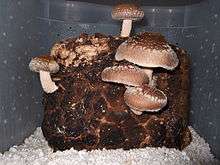Active hexose correlated compound

Active hexose correlated compound (AHCC) is an alpha-glucan rich nutritional supplement produced from the mycelia of shiitake (Lentinula edodes) of the basidiomycete family of mushrooms. The compound is a subject of research as a potential anti-cancer agent, but has not been conclusively found to treat cancer or any other disease, and there are conflict of interest concerns about the published research.[1][2] AHCC is a alternative medicine in Japan.[3]
Chemical composition
AHCC is a group of chemicals taken from fungus.[4] These include beta-glucan (β-glucan) and acetylated α-glucan.[5]
As a supplemental alternative medicine
AHCC is used in Japan as a supplement. It is available to the general public in Japan and China without a prescription and many people use it for general health maintenance and treatment of acute infections. Its legal status is that of a "functional food".
Research
Nearly all of the research into AHCC has been funded by the manufacturer, which complicates the discussion of currently available results – independent research is needed to verify them.[2] The mechanism of action of AHCC is poorly understood and there is little known about its safety.[2] As of 2011 clinical research into AHCC has been of poor quality: there are no large-scale studies or randomized controlled trials.[2]
Laboratory research suggests AHCC may have immunostimulatory effects.[2]
AHCC has been proposed as a treatment for cancer, but research into its effectiveness has produced only uncertain and inconclusive evidence.[1] Detailed research is needed into the pharmacology of AHCC before any recommendation of its use as an adjuvant therapy can be made.[2]
Cancer
Research on the effects of AHCC in people with cancer is not consistent. Some limited research suggests that taking AHCC may improve quality of life in people with stomach, colon cancer. However, other early research suggests that taking AHCC does not improve quality of life or treatment in people with different types of cancer. Early research suggests that taking AHCC daily for 6 months does not benefit people with prostate cancer.[4]
Hepatitis C: Early research suggests that taking AHCC daily for 6 months does not benefit people with hepatitis C.[4]
See also
References
- 1 2 "AHCC". WebMD. Retrieved 13 October 2016.
- 1 2 3 4 5 6 Shah SK, Walker PA, Moore-Olufemi SD, Sundaresan A, Kulkarni AD, Andrassy RJ (2011). "An evidence-based review of a Lentinula edodes mushroom extract as complementary therapy in the surgical oncology patient". JPEN J Parenter Enteral Nutr (Review). 35 (4): 449–58. doi:10.1177/0148607110380684. PMID 21628606.
It is important to note that the vast majority of the published research on AHCC has been supported by the manufacturer.
- ↑ Hyodo I, Amano N, Eguchi K (April 2005). "Nationwide survey on complementary and alternative medicine in cancer patients in Japan". Journal of Clinical Oncology. 23 (12): 2645–54. doi:10.1200/JCO.2005.04.126. PMID 15728227.
- 1 2 3 "AHCC: Uses, Side Effects, Interactions and Warnings - WebMD". www.webmd.com. Retrieved 2016-07-28.
- ↑ Fujii H, Nakagawa T: Novel substance having physiological activity, process for producing the same, and use, U.S. Patent Application Publication, Mar 6, 2003.